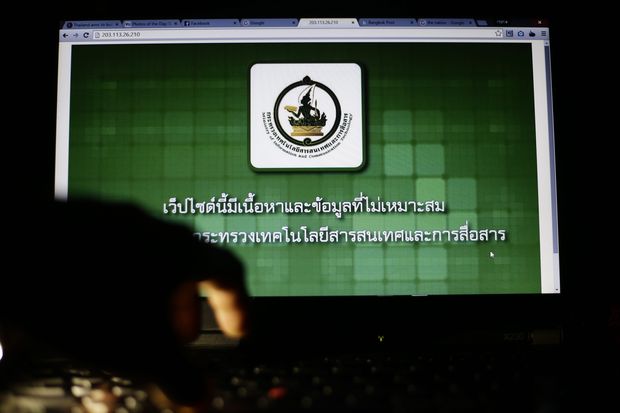
Deputy Prime Minister Prajin Juntong has tried to calm down concerns about the government's single gateway initiative, saying the issue is still under study and has not been implemented.
A single gateway is the combination of all internet access channels, or gateways, into one for easy monitoring, much like the "Great Firewall of China".
Thailand liberalised internet services shortly after the 1997 crisis and there are now more than 10 internet gateways, both for commercial (True, 3BB, TOT, CAT Telecom, etc) and non-commercial use, according to the National Electronics and Computer Technology Center (Nectec).
"The goal is for cybersecurity but at present nothing has been done. All companies can still provide their internet services," ACM Prajin told Thai media.
He insisted it was not compulsory for these operators to merge their infrastructure.
But ACM Prajin said TOT and CAT Telecom, the two state-owned internet service providers, might start a pilot project on this, but mainly to optimise their resources.
"In any case, I stress this is just an idea. We have to be very careful about this. We want to focus on serving people, not on censoring," he added.
The single gateway issue has created an uproar since Wednesday after a twitter user pointed to what Prime Minister Prayut Chan-o-cha had ordered the Ministry of Information and Communication Technology (ICT) to do.
The Public Relations Department link in the tweet quoted cabinet secretary Ampon Kittiampon as saying the PM had told the ICT Ministry at the July 14 cabinet meeting to implement the single gateway "urgently".
The follow-up came after the cabinet had resolved on June 30 to have the ICT Ministry, in collaboration with the Justice Department and the Royal Thai Police, set up the single gateway "to control access to inappropriate websites and international data flows".
They were also instructed to check relevant laws and quickly draft new ones as needed, Mr Ampon added, quoting the June 30 cabinet resolution.
The resolution, however, could not be found the cabinet meeting documents available for downloading at the government's website.
While the junta made no secret of its wish to have a single gateway after seizing the ruling power, there were no reports on its progress up until this week.
- Earlier report: ICT minister: Gateway for the economy
While it reasoned the consolidation would save costs, improve services and lay the foundation for Thailand's digital economy, what was left unsaid was monitoring and censoring could be done more easily at the gateway level too.
Local IT experts, however, said the national single gateway idea was easier said than done.
Given the current amount of traffic, any attempt to force it through a single channel will result in slow internet access, the extent of which will depend on the technology used, Arthit Suriyawongkul of the Thai Netizen Network told Prachatai on Wednesday.
Moreover, a single gateway means a single point of failure where the country would go completely dark should some technical issues occur.
"Cybersecurity's three components — confidentiality, integrity and availability — will all be compromised," he said.
He also pointed out the possibility of data interception, which was what authorities attempted to do based on an ICT Ministry document in 2014 on the setting up of a committee to test access to secure socket layer (SSL) data.
The single gateway will enable authorities to access anyone's passwords through a man-in-the-middle attack where the attacker secretly relays and possibly alters the communication between two parties who believe they are directly communicating with each other, he added.
A poll set up at Change.org for people to sign up against the initiative attracted 51,000 people in two days.

